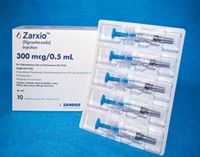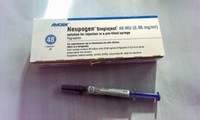Advertisement
Grab your lab coat. Let's get started
Welcome!
Welcome!
Create an account below to get 6 C&EN articles per month, receive newsletters and more - all free.
It seems this is your first time logging in online. Please enter the following information to continue.
As an ACS member you automatically get access to this site. All we need is few more details to create your reading experience.
Not you? Sign in with a different account.
Not you? Sign in with a different account.
ERROR 1
ERROR 1
ERROR 2
ERROR 2
ERROR 2
ERROR 2
ERROR 2
Password and Confirm password must match.
If you have an ACS member number, please enter it here so we can link this account to your membership. (optional)
ERROR 2
ACS values your privacy. By submitting your information, you are gaining access to C&EN and subscribing to our weekly newsletter. We use the information you provide to make your reading experience better, and we will never sell your data to third party members.
Pharmaceuticals
U.S. appeals court maintains six-month notice for generic-like biological drugs
Ruling could delay introduction of lower-priced biosimilar
by Glenn Hess
July 8, 2016

U.S. makers of generic-like versions of biological drugs must always give six months’ notice to brand-name rivals before launching their products, a federal appeals court ruled on July 5.
The decision by the U.S. Court of Appeals for the Federal Circuit has significant implications for when biosimilar drugs may enter the marketplace. It could slow competition that would likely lower the price of expensive brand-name biologic drugs.
The appeals court said makers of generic-like biosimilars must give manufacturers of biologic drugs a 180-day notice as mandated by Congress in the Biologics Price Competition & Innovation Act (BPCIA). This is required even if biosimilar and brand-name makers exchange manufacturing and patent information, the court found. That interchange is supposed to help companies resolve any legal disputes over intellectual property issues.
The case involved Apotex Inc.’s proposed biosimilar version of Amgen’s blockbuster drug Neulasta (pegfilgrastim), which helps prevent infections during chemotherapy. Apotex maintained that because it swapped information with Amgen, it was allowed to opt out of providing the 180-day notice of marketing.
Under BPCIA, a biosimilar can get Food & Drug Administration approval via an expedited process and then marketed after a competitor exclusively markets the brand-name biologic for 12 years.
The 180-day notice can only be provided after FDA approves a biosimilar. Thus, Apotex said, making the notice mandatory in all circumstances would effectively extend the 12-year exclusivity period for brand-name biologics for another six months.
“Congress enacted a 12-year market exclusivity for [brand-name biologics]—not a 12.5-year market exclusivity,” Apotex argued.
Amgen, meanwhile, urged the Federal Circuit to uphold the 180-day advance notice requirement, arguing that nothing in the BPCIA’s approval pathway for biosimilars allows for exceptions.
The three-judge panel unanimously sided with Amgen.
But the court also indicated that there may be a way to avoid 12.5 years of exclusivity for brand-name biologics. “We have been pointed to no reason that FDA may not issue a license before the 11.5-year mark and deem the license to take effect on the 12-year date,” the opinion says.




Join the conversation
Contact the reporter
Submit a Letter to the Editor for publication
Engage with us on Twitter